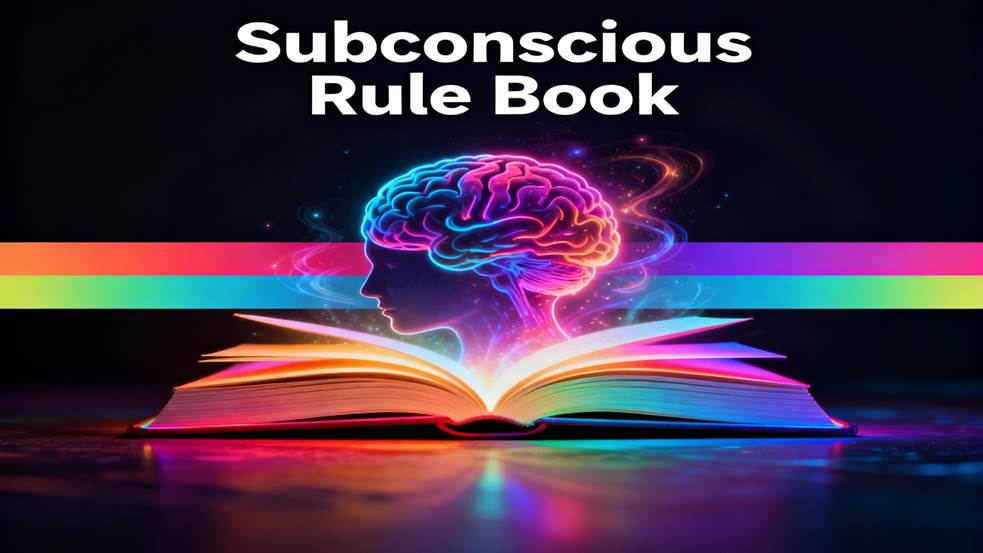|
Know Your Subconscious Rule Book
Your Mind's Unseen User Manual That You Never Read |
||||||||||||||||||||||||||
| RELATED ARTICLES | ||||||||||||||||||||||||||
|
Prem Kamble's Note
IntroductionHave you ever pondered why you occasionally respond to life's unexpected challenges with the composure of a Zen master, yet at other times appearing highly reactive or unsettled? According to Prem Kamble, this variability stems from a hidden, unwritten - yet remarkably influential - set of internal rules that silently governs human behavior at a subconscious level. Most of us know the rules of society and organizations like our workplace, but few realize there's an even more powerful rule book silently dictating our daily actions and reactions - one we never consciously read, but follow every day. If you think your company's rule books are hard to follow, wait till you meet the one in your own head. Welcome to the world of the Subconscious Rule Book™. The Subconscious Rule Book™ is a powerful concept introduced by Prem Kamble, a senior IT professional, author, and speaker, in his thought-provoking article on Subconscious Mind. It refers to the hidden, unwritten set of rules that quietly governs your thoughts, emotions, decisions, and reactions — without your conscious awareness. Imagine living your entire life by a set of rules written by a child - and you don't even know what is in the book. Yet these rules influence every decision you make. What Is the Subconscious Rule Book™?Kamble draws a clear comparison between the explicit rule books found in organizations and the implicit, internal "rule book" that governs our minds. In companies, rule books are written, distributed, and (at least in theory) read by employees. They provide clear guidelines for what is expected, what is rewarded, and what is not tolerated.However, in our personal lives, there exists a Subconscious Rule Book™ - a set of beliefs, assumptions, and habitual responses that have been programmed into us through upbringing, culture, and past experiences. Unlike company policies, these rules are not written down or consciously reviewed. Yet, they silently influence how we interpret situations, how we react to challenges, and even how we perceive ourselves and others. Prem Kamble, in his innovative article on the subconscious mind, draws an insightful parallel between the official rule books that govern companies and the invisible, internal "rule book" that governs our own thoughts, feelings, and behaviors. Just like in business, where every employee is expected to follow a thick manual of dos and don'ts (which, let's be honest, most people only skim), our minds operate under a set of subconscious rules we never consciously agreed to - but follow religiously anyway. Even more concerning is that the majority of these rules are established during early childhood, often lacking logic and reason, rendering them fundamentally irrational. Through repeated reinforcement, they become deeply embedded within the subconscious mind, leaving the conscious mind entirely unaware of their presence. As a result, most of us spend our entire lives governed by these hidden rules, unaware of their content. Imagine being governed throughout life by illogical rules authored by a child. Key Features of the Subconscious Rule Book™
The Impact of the Subconscious Rule Book™Prem Kamble emphasizes that just as a company's culture is shaped by its rule book, our individual personalities and life experiences are shaped by our subconscious rules. These rules can be empowering - helping us act with integrity, kindness, or discipline. But they can also be limiting, causing us to react with fear, anger, or self-doubt, often without understanding why.For example, a company rule might state, "Always escalate customer complaints to management." Similarly, a subconscious rule might be, "Never express anger," or "Seeking help is a sign of weakness." These internalized codes can guide our actions automatically, even when they no longer serve us. The Company Rule Book vs. The Mind's ManualLet's break it down:
Prem Kamble's genius is in highlighting that, just as companies are shaped by their rule books, our lives are shaped by these subconscious codes. The difference? At work, you can at least ask for a copy. Write to Me | Comments | Related Articles | Top Why Awareness Matters
Can You Rewrite the Rules?Here's the good news: Kamble suggests that, unlike the company manual, you can update your mind's rule book - but first, you have to realize it exists! Through self-awareness, reflection, and what he calls a "science of the mind," you can start to spot the outdated or unhelpful rules and replace them with ones that serve you better.Kamble admits that uncovering your subconscious rules and bringing them to conscious awareness is not easy. Meditation is one most effective method. Kamble shares a simpler more practical method in his article. Prem Kamble encourages us to reflect on our automatic reactions and question their origins. Are they based on conscious choice, or are they simply the result of old, unexamined rules? By identifying and updating these subconscious codes, we can align our behaviors more closely with our true values and aspirations. The Organizational AnalogyKamble's comparison with company rule books is particularly apt. In business, outdated rules can stifle innovation and morale. Similarly, outdated subconscious rules can hinder personal growth and happiness. Just as organizations periodically review and update their policies, individuals too must periodically reflect on and revise their internal rule book.SummaryThe Subconscious Rule Book™ is a powerful metaphor for the hidden set of beliefs and habits that govern our lives. By bringing these rules into conscious awareness, as Prem Kamble suggests, we can take charge of our own growth and well-being, just as a company thrives when it updates its rule book to meet new challenges.
So next time you catch yourself overreacting, procrastinating, or following an old habit, don't blame yourself - blame the Subconscious Rule Book™. And then, channel your inner CEO and start editing.
|

 Kamble argues that most of our suffering, confusion, or even our moments of unexpected grace, stem from this hidden manual. We react to situations not based on what's happening now, but on what our Subconscious Rule Book™ tells us "should" happen. It's like having a boss you've never met, but who micromanages your every move.
Kamble's insight is that awareness of the Subconscious Rule Book™ is the first step toward personal transformation. When we become conscious of these hidden rules, we gain the power to question them, challenge them, and - if necessary - rewrite them. This process is at the heart of self-improvement and spiritual growth.
Kamble argues that most of our suffering, confusion, or even our moments of unexpected grace, stem from this hidden manual. We react to situations not based on what's happening now, but on what our Subconscious Rule Book™ tells us "should" happen. It's like having a boss you've never met, but who micromanages your every move.
Kamble's insight is that awareness of the Subconscious Rule Book™ is the first step toward personal transformation. When we become conscious of these hidden rules, we gain the power to question them, challenge them, and - if necessary - rewrite them. This process is at the heart of self-improvement and spiritual growth.